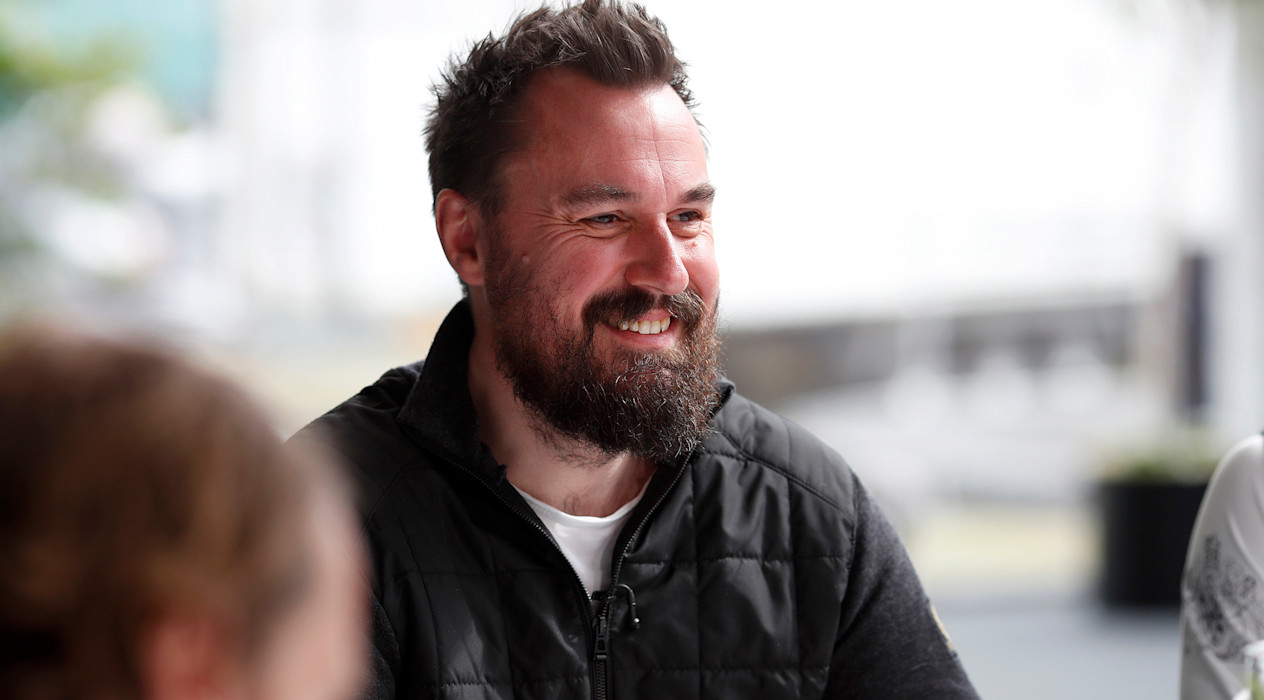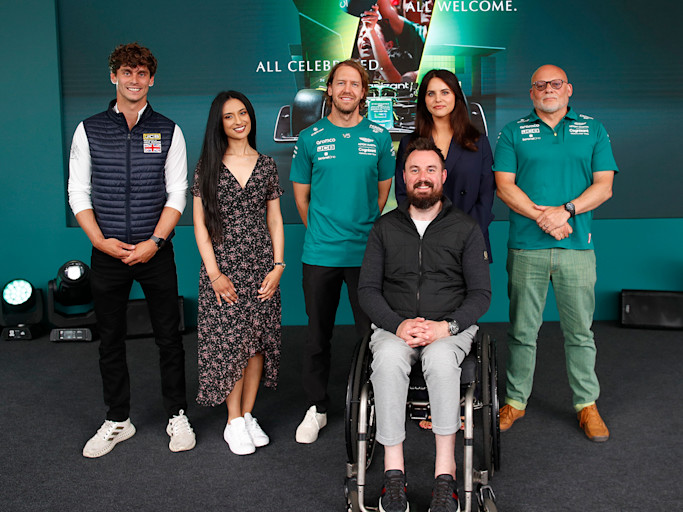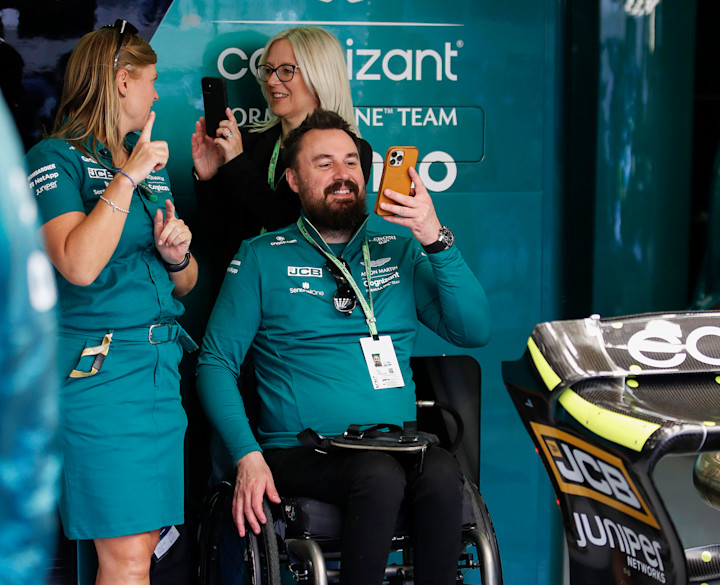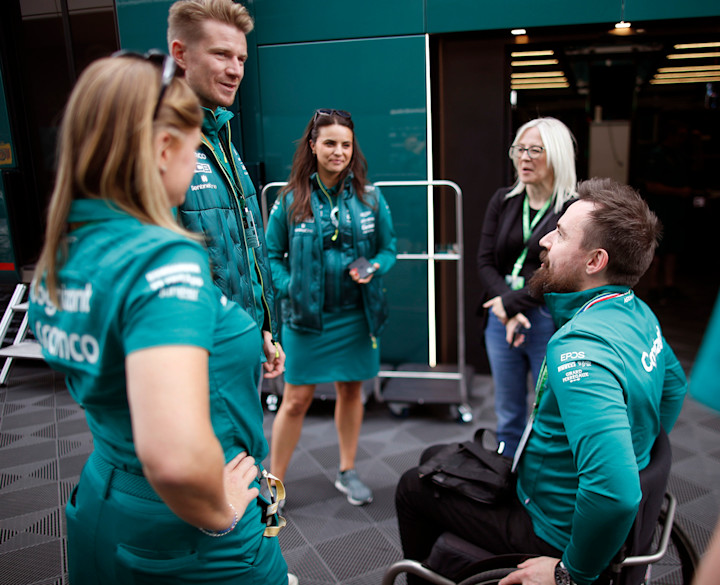
When a bolt severed his spinal cord in the 2017 Manchester Arena bombing, Martin Hibbert was told he would never walk again. Five years later he did the seemingly impossible: he climbed to the top of Mount Kilimanjaro.
In an effort to raise £1 million for the Spinal Injury Association and show that people can achieve anything with the right help, Martin scaled Africa's tallest mountain in a specially modified wheelchair to become only the second-ever paraplegic to reach the 5,685 metre-high summit in Tanzania.
Martin's mission is to change people's perception of what it means to be disabled, fighting for the inclusion of people who have to 'climb mountains' every day just to live their lives. He is determined to use his experience to have a positive impact on others.
He joined us for our thought-provoking 'United by Passion' roundtable discussion to explore diversity and inclusion in F1, and we couldn't resist discovering more about Martin's remarkable journey; a journey that epitomises Aston Martin F1's 'We Climb Together' philosophy – a relentless drive to overcome the odds time and again, to keep growing, to keep improving… to keep climbing.
United by Passion
Sebastian Vettel joins a roundtable discussion on diversity and inclusion in F1.

Martin, you joined us for our 'United by Passion' roundtable discussion. How did you find the experience?
To have a brand like Aston Martin want to talk about disability inclusion, and not be afraid to ask the difficult questions, is a big step. I applaud Aston Martin for having the confidence and bravery to do it.
I hope that the people who watched the roundtable, and other brands, are saying, 'If Aston Martin is doing it, maybe we should be doing it.' Nothing is going change until we have these kinds of discussions on a wider scale.
Just because I'm in a wheelchair, why shouldn't I come to F1 races? Why shouldn't I go to a nice restaurant? Why shouldn't I be able to travel the world?
On a personal level, I've been a fan of Aston Martin from the age of six, so for you to reach out was a big deal for me. I couldn't sleep before the night of the roundtable. It was like waiting for Christmas Day to arrive!
And what are you passionate about, Martin – other than Aston Martin, of course?
Since I was injured, I've been living a different life to what I was before. I like driving nice cars, wearing nice clothes, going to nice restaurants, travelling, but because I'm in a wheelchair sometimes that's not possible and I get angry about it.
Believe it or not, I don't feel disabled. I think I can do anything. I might not be able to run 100-metre hurdles…
…but you can climb Mount Kilimanjaro.
Exactly! [Laughs.] I really do think I can do anything, though. I might need help and support, or for something to be adapted, but I can do it.
When I became a trustee of the Spinal Injuries Association, I discovered that seven people a day suffer a spinal cord injury but only one in three receive the kind of help and support that I got to live a fulfilled life; that can't happen anymore – it's not good enough.
Making it possible for everybody with a spinal cord injury to live a fulfilled life is what I'm passionate about now.
What's your advice to anyone who's told that they can't do something?
Fight for what you believe in.
Sometimes it is hard; there needs to be greater awareness around disability. If you look at the journey that the BAME and LGBTQ+ communities have been on over the past 50 years, people are finally becoming more perceptive, and we need to reach that point for disabled people.
People need to be more aware of the challenges we face and having discussions like we did in the 'United by Passion' roundtable will help us get there.

Nobody knew if someone with my injury could do it. A lot of people were saying it was a big risk.
You have to push the limits in Formula One and sometimes go beyond them to achieve success. How would you say you've pushed the boundaries?
When I asked my spinal doctor whether I could get to the top of Mount Kilimanjaro, he explained how there was no data or research to support it – there was nothing to go on. It was completely uncharted territory.
The only paraplegic who had made the summit had an incomplete sever of the spinal cord whereas my spinal cord was completely severed.
Nobody knew if someone with my injury could do it. My wife didn't want me to do it, my mum didn't want me to do it and a lot of people were saying it was a big risk, but that's exactly why I wanted to do it. I wanted to push the limits.
What gets you through the toughest moments – what keeps you going?
Life with a spinal cord injury is like a never-ending game of snakes and ladders. Some days you're flying, you're climbing those ladders, and then some days are really tough and set you back. Things like bowel or bladder issues, or not having the strength to get out of bed, an able-bodied person doesn't necessarily see.
You can see that I can't walk, but you can't see the hidden effects. There are tough moments, of course there are, but if I'm having a tough day I always say, 'I'll roll the dice again tomorrow and be on my way up a ladder.'
And what about the days you spent climbing Mount Kilimanjaro?
I didn't want to know anything about Kilimanjaro! On the first day, I didn't even know what route we were taking. [Laughs.] If I knew everything about the five days ahead, my mind would have just kept wandering.
I wouldn't have remained focused. I just wanted to work towards the climb – taking every day as it comes.
When we got to the mountain, I almost became a bit of a recluse. People were wondering if I was alright because I wasn't really talking, but I was just so focused on the task in front of me. I was in the zone and didn't want to come out of it – I didn't want any distractions.
Before we started the climb, you could see Mount Kilimanjaro from our hotel, and I had a moment with the mountain.
I said, 'Look, I respect you. I've done everything to prepare – all the mental and physical training to put my mind and body in the best shape possible – and nothing is going to stop me. Now, show me respect in return or there will be trouble.'
And, apart from a bit of bad weather on the second day, it did respect me. [Laughs.]
What was running through your head when you reached the summit?
To be only the second paraplegic to reach the top, and after everything I'd been through, it was… it was a very emotional moment. But there was no way I wasn't going to make it. I wanted to send a clear message: don't write somebody off just because they're in a wheelchair, if you give them the right help and support, they can do something that's impossible.

Without teamwork, without having people around you who believe in you as a person and want to support you, you will never do it.
How did achieving this feat change you as a person – what has it taught you?
I don't think it's changed me in terms of my thoughts on why I'm in the world and why I survived the Manchester Arena bombing. It just made me even more determined.
I'm on this Earth to change the lives of people with spinal cord injuries and the perception of people with disabilities. That's why I'm here. I survived for days like this, for days like summiting Mount Kilimanjaro.
The people we met in Tanzania were incredible. One of the porters had never seen someone in a wheelchair and he said to me, 'From this day forward I live my life like Martin – like a lion.'
To have such a huge impact on someone was, for me, in many ways, a greater achievement than reaching the summit.
Success in F1 requires exceptional teamwork. Could you have achieved what you have without the support of others? In any walk of life, success requires teamwork, whether it's sport, business, or even a marriage.
People who've followed my story will have seen that I've talked about my life being like a that of an F1 driver because I've got such a big team around me, but many of them you don't see.
In F1, you see the people involved in the pitstops and those on the pitwall, but you don't see all the people who are working to design and make the car. It's very much the same for me.
I had 10 people with me for the climb up Mount Kilimanjaro, but you didn't see the sports people who were getting me physically prepared – doing strength and conditioning work and altitude training. You didn't see the medical people who were helping to ensure my body and mind were healthy.
Without teamwork, without having people around you who believe in you as a person and want to support you, you will never do it. And this was a key message of the Kilimanjaro climb: 'I can't do this without a team but look what I can do when I've got the right help and support. I can, literally, climb a mountain.'
What's next?
I'm going to do something that's not been done. I want to be the first wheelchair user to get to Mount Everest base camp, and two Royal Marine Commandos and two Gurkhas have got in touch to say that they can help me get up there.
Not content with conquering Kilimanjaro then?
Mount Everest was always number one for me. Mount Kilimanjaro was obviously a great feat, but it was always number two because a paraplegic had already done it. Everest is the one that I've always wanted to do. And why not? If Royal Marine Commandos say it can be done, then who's going to argue with that?! [Laughs.]
I'm vice president of the Spinal Injury Association, so there's a lot of work to do there. I've still got a bit more money to raise. The target is £1 million – we're at £600,000 right now so we're nearly there.
To be able to hand a cheque over to the charity that have helped me live a fulfilled life will be a very proud day for me, and I hope many more people will join the revolution to help me change how the world perceives disability.
If you've been inspired by Martin's incredible story, you can show your support by making a donation to the Spinal Injuries Association via the Martin’s Mountain JustGiving page, and watch 'Martin's Mountain: Conquering Kilimanjaro' on BBC iPlayer to witness the highs and lows of his astonishing climb.
#IAMSTORIES
Access I / AM to get closer to the team.


































